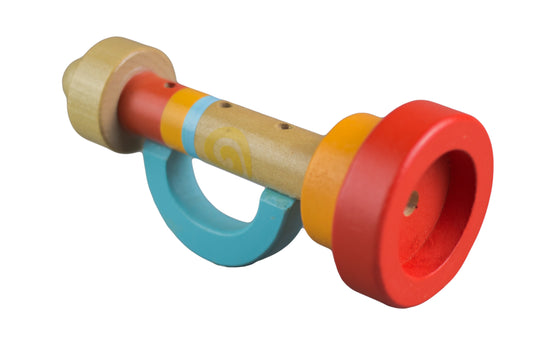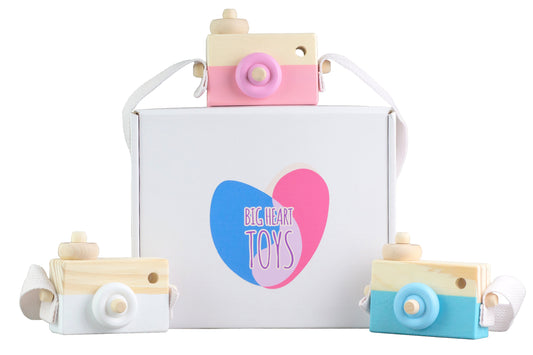Cooperative play is one of 15 different types of play, a social interaction in which children engage in activities or games that require collaboration, teamwork, and mutual assistance to achieve a common goal. Unlike competitive play, in which participants aim to outperform each other, cooperative play emphasizes shared objectives and joint efforts.
This type of play promotes positive social skills, such as communication, problem-solving, empathy, and cooperation, as individuals work together, share responsibilities, and support one another. Cooperative play can take various forms, from board games and sports to group projects and role-playing scenarios, fostering a sense of unity and the understanding that collective efforts can lead to successful outcomes.
Participating in cooperative play together can also provide an irreplaceable bonding experience for you and your children. Holding this space for them to learn, grow, and be a leader can give them feelings of validation and togetherness that help them thrive.
Why Is Cooperative Play Important for Child Development?
Cooperative play plays a crucial role in child development for several reasons. Most importantly, it enhances social skills by providing opportunities for children to interact with their peers, communicate effectively, and collaborate towards a common goal. Through cooperative play, children learn to take turns, share resources, negotiate, and resolve conflicts, developing essential interpersonal skills that are vital for building relationships throughout their lives.
Cooperative play also fosters cognitive development. When children engage in collaborative activities, they are exposed to different perspectives, problem-solving strategies, and creative thinking. They learn to think critically, plan ahead, and strategize, which promotes their cognitive abilities and enhances their decision-making skills.
Finally, this form of play nurtures emotional development. It encourages empathy and understanding as children learn to consider the thoughts and feelings of others. They develop a sense of belonging which contributes to their emotional well-being and helps them develop positive self-esteem.
This is a valuable platform to help children to develop problem-solving skills. As they encounter challenges and obstacles during group activities, they’re required to think creatively and collaboratively to find solutions. This enhances resilience, adaptability, and resourcefulness, letting children approach problems confidently.
What Are the Benefits of Cooperative Play?
Let’s dive a little deeper into these social, cognitive, and emotional benefits. As parents, we all want our children to learn and grow in these areas to benefit them in the future positively.
Improve Communication and Interaction Skills
This fun and engaging play supports language development. Children engage in meaningful conversations, negotiate rules, and exchange ideas, which enhances their communication skills and vocabulary. They learn to express themselves effectively, listen actively, and understand different perspectives, all of which are vital for language development.
Little ones learn to express themselves, their concerns, and their ideas clearly, which can help them down the line. What’s more, they learn about nonverbal cues and communication, picking up on gestures and facial expressions. This nonverbal interaction teaches them to read other people’s emotions and intentions.
Taking turns and sharing is a difficult skill for toddlers and young children. This is something that children are often disciplined for or taught verbally. Cooperative play, however, provides the perfect context for children to naturally work on these skills and experience the importance of taking turns and being patient rather than being told.
Enhance Problem-Solving Skills
It’s easy to forget that many times when toddlers or children face problems, they encounter these conflicts for the first time. During cooperative play, children are faced with challenges and obstacles that require them to work together to find solutions. They learn to pool their ideas, think creatively, and brainstorm possible strategies as a team.
Collaborative problem-solving allows children to benefit from multiple perspectives, fostering innovative thinking and expanding their range of potential solutions. They have to think critically and analyze different approaches in a natural setting.
Children can divide up tasks and roles. This is as simple as assigning different roles in a play-pretend scenario, but it actually allows them to recognize their own strengths and the strengths of others.
Encourage Creativity
Cooperative play is about imagination and fostering a stimulating environment for creativity. When children engage in cooperative play, they bring their unique ideas and perspectives to the group. They share and exchange these ideas through collaboration and discussion, inspiring each other and expanding their creative thinking.
Cooperative play encourages children to engage in imaginative and pretend play. They have the freedom to explore their imagination, create fictional scenarios, and experiment with different ideas. This uninhibited playfulness allows children to generate unique stories and create new make-believe worlds.
This playtime often involves collaborative projects, such as building structures, creating art, or organizing performances. These activities provide children with opportunities to express their creativity together. They combine their ideas and contribute to a shared outcome, cultivating a sense of collective ownership and pride in their creative endeavors.
Deepen Emotional Intelligence and Empathy
When you think about it, children are not often free to make their own choices and decisions. The autonomy given to them during cooperative play creates a sense of independence and pride.
Children get to interact with their peers in various situations, experiencing a range of emotions themselves and observing the emotions of others. This exposure helps them develop emotional awareness by recognizing and labeling different emotions in themselves and their playmates.
They learn to put themselves in others' shoes, imagining how their actions or decisions might affect their friends or siblings. This perspective-taking fosters empathy as children develop a deeper understanding of others' experiences and emotions, promoting compassionate and considerate behavior.
Within cooperative play, children often provide support and encouragement to their peers. They offer assistance, praise accomplishments, and provide emotional comfort when needed. This supportive atmosphere also cultivates empathy as children learn to recognize and respond to the emotions and needs of their playmates.
Lastly, this type of play can be emotionally stimulating, requiring children to manage their own emotions effectively. They learn to regulate their emotions, control impulses, and consider the impact of their behavior on others' feelings. This self-regulation promotes emotional intelligence as children develop greater self-awareness and the ability to respond empathetically to others, fostering positive social interactions.
What Is the Long-Term Impact of Cooperative Play?

Engaging in cooperative play has long-term impacts on individuals, shaping their social, emotional, and cognitive development. The skills acquired during cooperative play, such as effective communication, teamwork, problem-solving, empathy, and conflict resolution, lay the groundwork for positive relationships and success in various aspects of life. Cooperative play fosters the ability to collaborate with others, work towards shared goals, and appreciate diverse perspectives.
It promotes a sense of community, encourages inclusive behavior, and enhances social competence. These skills and attitudes developed through cooperative play carry forward into adulthood, influencing individuals' interactions, leadership abilities, and overall well-being, making cooperative play a vital foundation for lifelong social engagement and success.
When Should Cooperative Play Start?
Cooperative play can be as simple as coloring a coloring book together or playing a game or as complex as a big group construction project. Cooperative play typically starts in the toddler years, around age three. Before that, children typically engage in parallel play first (between ages one and two) and associative play next (between ages two and three), which both lead up to cooperative play.
Around the age of three, cooperative play starts to emerge more prominently. It's important to note that every child develops at their own pace, and these age ranges are general guidelines. Some children may show earlier or later interest and abilities in cooperative play.
Parents, caregivers, and educators can encourage and facilitate cooperative play by providing opportunities for children to engage in group activities, promoting sharing and turn-taking, fostering communication and problem-solving skills, and creating a supportive and inclusive play environment.
How Can I Encourage Cooperative Play?

By providing early experiences and opportunities for cooperative play, children can develop and refine their social skills, collaboration abilities, and empathy, setting a foundation for positive social interactions and relationships as they continue to grow.
This becomes even more valuable when considering the needs of neurodivergent individuals and their families. Here are some strategies that can help promote cooperative play while taking into account the unique characteristics and strengths of neurodivergent children:
- Create an inclusive and supportive environment: Establishing a safe and welcoming play environment accommodates all children's diverse needs and preferences. Consider sensory sensitivities and provide play materials and spaces that cater to different sensory experiences. You can encourage understanding, empathy, and respect among all participants, maintaining an inclusive and supportive atmosphere.
- Offer structured cooperative activities: Introduce structured activities that encourage cooperation and teamwork. These can include group games, collaborative art projects, or problem-solving challenges. Help them to clearly define roles and expectations, providing guidance and support as needed, especially for children who may require additional assistance or prompts.
- Foster communication and social skills: Facilitate communication and social interaction by modeling appropriate social skills. Encourage active listening, turn-taking, and respectful communication. If needed, you can provide visual supports, such as visual schedules or social stories, to help neurodivergent children understand the play sequence and expectations. Incorporate visual or written prompts to aid in understanding and expressing emotions during play.
- Tailor activities to individual interests and strengths: Consider all children's unique interests, strengths, and preferences when planning cooperative play activities. Incorporating special interests or talents into the play scenarios is always fun to enhance engagement and motivation. Adapt the activities to match any sensory, cognitive, or motor needs, ensuring a more meaningful and enjoyable experience for everyone involved.
What Play Ideas Can Foster Cooperative Play?
When setting up a cooperative play experience, you can establish play zones or areas with a variety of play materials, like building blocks, puzzles, musical instruments, art supplies, board games, or dramatic play props.
For younger children, you may want to pose ideas or specific challenges. You can set a specific goal for the children to try to achieve or ask how they can set up a concert or pizza kitchen! You can choose to assign roles or offer different roles in the scenario and allow the children to decide who will do what. This gives them a little more ownership over their playtime.
If you’re joining in the play, model communication, teamwork, and cooperative behavior to show the dos and don’ts of being kind during playtime. Celebrate achievements — even small ones — to positively reinforce the little ones and highlight the importance of working together toward a greater goal.
How Can I Address Challenges in Cooperative Play?
When children are playing, there will likely be challenges or issues that arise. These might include communication problems, unequal participation, conflict resolution, or problems with varying skill levels.
It’s important to remember that you do not want to be the problem-solver in these situations. Instead, you want to lean more into a facilitator role and help your children navigate these challenges.
You may offer sentence prompts to promote communication, such as “I am feeling ___ because ___ happened.” and encourage them to brainstorm different problem-solving methods. You can even offer solutions and let them decide which one best fits their specific scenario.
Navigating challenges this way, rather than just telling them what to do, builds their toolbox of problem-solving methods and helps them understand how to resolve issues.
The Bottom Line
Cooperative play is so important for children's development, nurturing essential social, emotional, cognitive, and communication skills. Through cooperative play, children learn to collaborate, negotiate, and problem-solve together, enhancing their ability to work effectively in groups and develop positive relationships. It fosters empathy, promotes understanding of others' perspectives, and cultivates a sense of belonging and inclusion.
By engaging in cooperative play, children build a solid foundation for social competence, teamwork, and lifelong skills that are essential for success in relationships, academics, and social settings.
It’s never too late to get started and introduce cooperative play! Choose sensory-friendly toys with Big Heart Toys, set up a play space, and see what wonderful worlds your children can create.
Sources:
Language Development | Raising Children
What is Parallel Play + 5 Ways it Benefits Your Child | NAPA
Parents' Guide to the Stages of Play | Pathways.org
Companion Guide for Visual Cues | UNC.edu
7 Ways to Teach Kids to Manage Their Own Conflicts | Edutopia






